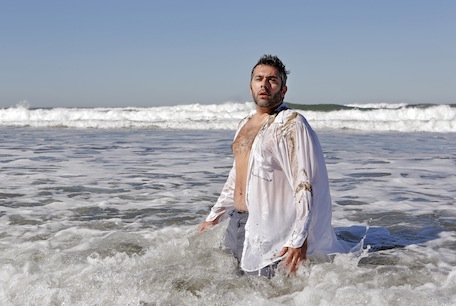
A transformed Ulysses
Monteverdi’s Il ritorno d’Ulisse in patria (The Return of Ulysses to his Homeland) was the third opera in West Edge Opera’s Festival 2015. True to its mission, the company trimmed down the opera, making it sleeker and rearranging it into more contemporary, and therefore, possibly, more palatable fare for its audience.
Gone were the allegorical figures of Human Frailty, Time and Fortune – so essential to the religious tropes of medieval and Renaissance theater. Rearranged also was the plot, so that Queen Penelope’s despairing fidelity is more another element of plot, rather than a front-and-center study of virtue. What an old-fashioned concept: virtue!
Interestingly though, Director Mark Streshinsky, who is also the company’s artistic director, held onto the Roman gods, the pastoral setting and the Homeric story, rather than giving over entirely to a contemporary reading. He also played to one of his strong suits, comedy. A fuzzy sheep-ish (emphasis on the -ish) puppet was added to the company, playing a strong role in the arms of Minerva disguised as a shepherd boy. And Minerva and Ulysses’ son Telemachus fly through the air on a magical scooter, a long silken scarf waving behind as if caught in flight. The comic characters that existed in the original – Penelope’s bumbling suitors and the glutton Iro – were thrown into high comic relief.
Even so, the beauty of Monteverdi’s music shone through. Beginning most strikingly with Ulysses’ opening song “Dormo ancora o son desto?” (“Am I still asleep, or am I awake?”). Tender and sorrowful, the originally tenor part was movingly sung by baritone Nikolas Nackley, as the King of Ithaca. Swept ashore by the god Neptune, Ulysses finds himself returned to his homeland, and grieving for his abandoned queen, Penelope. Kindra Scharich, gracing the soprano part of Minerva with warm mezzo color, takes Ulysses under her wing, returning him to friend and family.
Mezzo Sara Couden sang the role of Queen Penelope, her extraordinary voice enriching the long lament “Di misera regina non terminati mai dolenti affani!” (“Miserable Queen, sorrow and trouble never end!”), which introduces her to the play’s action. The style is declamatory, rather than ornate, and carries with it real emotional punch.
Tenor Gary Ruschman and bass Aaron Sørensen doubled in roles as the gods Jove and Neptune and the suitors Pisandro and Antinoo. Michael Desnoyers made a lovely shepherd Eumete. And Jonathan Smucker sang the third suitor. The gluttonous Iro was gleefully sung by Ted Zoldan. Clearly everyone enjoyed his parts, which often required baroque ornamentation.
The lack of a definitive score was looked at a musical opportunity, rather than a deficiency. The supporting band was set at five string parts, theorbo and baroque harp. Gilbert Martinez directed from the harpsichord.
One of the more fascinating musical choices was the use of a regal (accent on the second syllable) as one of the continuo instruments. The regal is an organ-like instrument, something like a harmonium, with a small keyboard and two bellows worked by a second player. The regal used for the opera had a distinctly reedy vibration with a hollow resonance, well adapted to work as a supporting instrument for the god Neptune.
The venue was the American Steel Studios in East Oakland, which provides studios to a number of artists and performers. While the venue had surprisingly good acoustics, the August 7 performance was often, and irritatingly, marred by a background noise of power tools. That was a disappointment in an otherwise sunny production.
– Jaime Robles
Photo: Nikolas Nackley as Ulysses.
